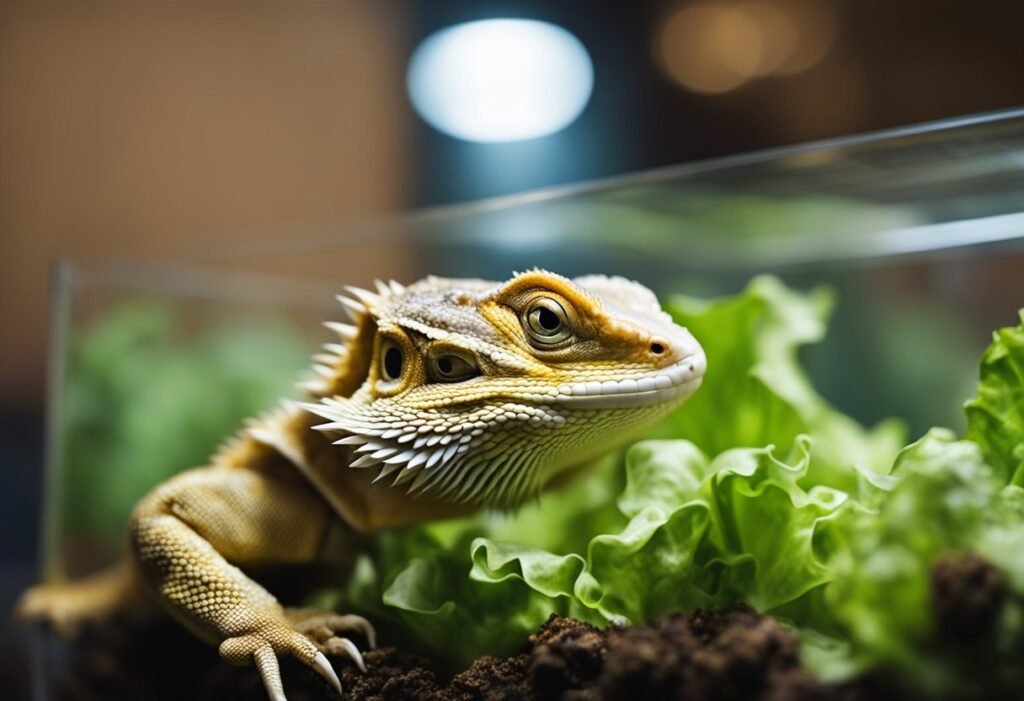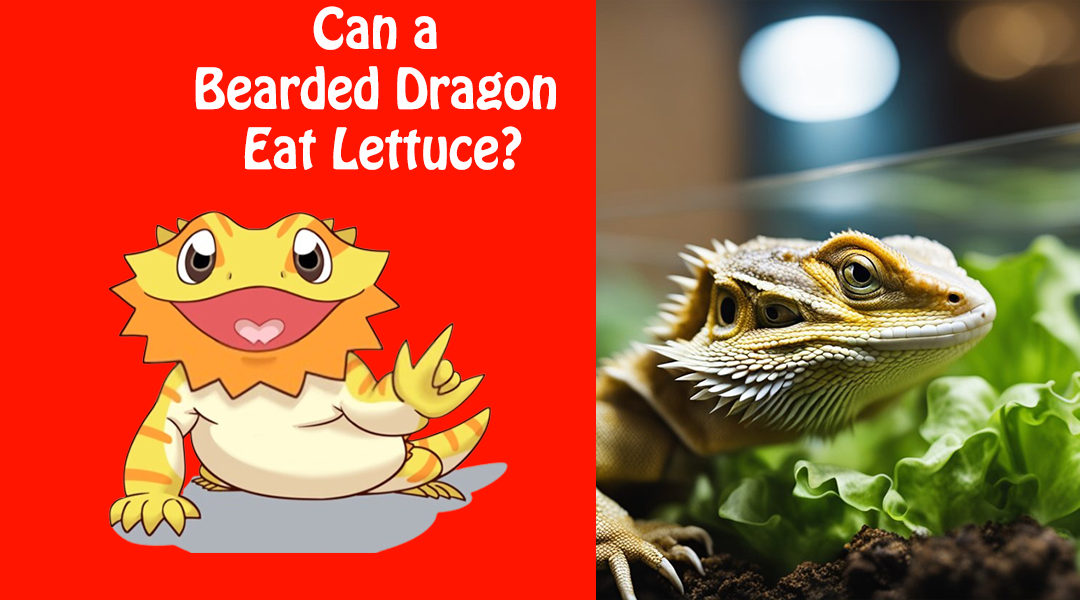Bearded dragons are popular pets for reptile enthusiasts. They are known for their docile nature and unique appearance, including their scaly skin and distinctive beard. As with any pet, it is important to ensure that their diet is appropriate for their health and well-being. One common question that arises is whether or not bearded dragons can eat lettuce.
Lettuce is a staple in many human diets, but it may not be suitable for all animals. While it is a low-calorie and low-fat option, it is also low in nutrients that are essential for bearded dragons, such as calcium and protein. In addition, some types of lettuce, such as iceberg lettuce, have a high water content that can lead to digestive issues in bearded dragons. Despite these concerns, there are some types of lettuce that can be fed to bearded dragons in moderation.
Bearded Dragon Dietary Basics

Nutritional Needs
As responsible pet owners, it is important to understand the nutritional needs of our bearded dragons. A balanced diet is crucial for their overall health and well-being. Bearded dragons are omnivores, meaning they eat both plants and animals. They require a diet that is high in protein, low in fat, and rich in vitamins and minerals.
Protein is essential for the growth and maintenance of muscle tissue, while vitamins and minerals are important for maintaining a healthy immune system and preventing disease. Bearded dragons also require a source of calcium to maintain strong bones and prevent metabolic bone disease.
Safe Foods for Bearded Dragons
Not all foods are safe for bearded dragons to consume. It is important to know which foods are safe and which should be avoided. Safe foods for bearded dragons include leafy greens, vegetables, fruits, and insects. Leafy greens such as collard greens, mustard greens, and dandelion greens are excellent sources of calcium and other essential vitamins and minerals.
Vegetables such as squash, carrots, and sweet potatoes are also good choices. Fruits such as strawberries, blueberries, and mangoes can be given as treats in moderation. Insects such as crickets, mealworms, and dubia roaches are excellent sources of protein for bearded dragons.
Risks of Improper Diet
Feeding your bearded dragon an improper diet can lead to a variety of health problems. A diet that is high in fat and low in protein and vitamins can lead to obesity, liver disease, and other health issues. Feeding your bearded dragon too much calcium can also lead to problems such as kidney stones and gout.
It is important to provide your bearded dragon with a balanced diet that meets their nutritional needs. Avoid feeding them foods that are high in fat, low in protein, or lacking in essential vitamins and minerals. By providing your bearded dragon with a healthy diet, you can help ensure that they live a long and healthy life.
Lettuce and Bearded Dragons

Lettuce is a popular leafy green vegetable that is often used in salads and sandwiches. However, when it comes to feeding bearded dragons, not all types of lettuce are safe for consumption. In this section, we will discuss the different types of lettuce and their nutritional value, as well as the impact of iceberg lettuce on hydration.
Types of Lettuce
There are various types of lettuce, including romaine, butterhead, iceberg, and leaf lettuce. Out of these, romaine lettuce is the most recommended for bearded dragons due to its high nutritional value. On the other hand, iceberg lettuce is not recommended for bearded dragons as it has a low nutritional value and can cause digestive problems.
Nutritional Value of Lettuce
Lettuce is a good source of vitamins and minerals, including vitamin A, vitamin C, calcium, and iron. However, it is important to note that lettuce alone does not provide sufficient nutrition for bearded dragons. It should be given as a supplement to their regular diet of insects and vegetables.
Iceberg Lettuce and Hydration
Iceberg lettuce is known for its high water content, but it should be avoided when feeding bearded dragons. While it may seem like a good choice for hydration, it can actually have the opposite effect. Iceberg lettuce has a low nutritional value and can cause diarrhea, which can lead to dehydration.
In conclusion, bearded dragons can eat lettuce, but it should be given in moderation and only certain types. Romaine lettuce is the best choice as it has a high nutritional value, while iceberg lettuce should be avoided due to its low nutritional value and negative impact on hydration.
Feeding Lettuce to Bearded Dragons
Frequency of Feeding Lettuce
Lettuce can be a healthy addition to a bearded dragon’s diet, but it should not be the main component. We recommend feeding lettuce to bearded dragons no more than once or twice a week. Overfeeding lettuce can lead to digestive issues and potential health problems.
Preparing Lettuce for Consumption
Before feeding lettuce to your bearded dragon, it is important to properly prepare it. We recommend thoroughly washing the lettuce to remove any dirt or pesticides. It is also important to remove the tough stems and ribs, as they can be difficult for bearded dragons to digest.
Portion Sizes
When feeding lettuce to bearded dragons, it is important to provide the appropriate portion size. We recommend offering a few small pieces of lettuce, about the size of the bearded dragon’s head. Overfeeding lettuce can lead to digestive issues and potential health problems, so it is important to monitor portion sizes.
Overall, lettuce can be a healthy addition to a bearded dragon’s diet when fed in moderation and prepared properly. As with any new food, it is important to introduce lettuce slowly and monitor your bearded dragon’s reaction.
Health Implications

Benefits of Lettuce
Lettuce is a good source of hydration and fiber for bearded dragons. It can help with digestion and prevent constipation. Additionally, lettuce contains vitamins A and C, which are important for maintaining healthy skin and eyesight.
Potential Health Risks
While lettuce can be a healthy addition to a bearded dragon’s diet, it should not be the main staple. Lettuce is low in nutritional value and can lead to health problems if consumed in excess. Bearded dragons may also have difficulty digesting lettuce, which can lead to digestive issues.
Signs of Dietary Issues
If a bearded dragon is experiencing dietary issues, it may exhibit symptoms such as lethargy, lack of appetite, and diarrhea. If you suspect that your bearded dragon is having dietary issues, it is important to consult a veterinarian.
In conclusion, while lettuce can be a healthy addition to a bearded dragon’s diet, it should be fed in moderation and should not be the main staple. It is important to monitor your bearded dragon’s diet and watch for any signs of dietary issues.
Alternative Greens and Vegetables
Recommended Greens
While lettuce is not recommended for bearded dragons, there are plenty of other greens that are safe and healthy for them to eat. Here are some of our top recommendations:
- Collard greens: These are a great source of calcium and vitamin A, and are low in oxalates which can cause kidney stones in reptiles.
- Mustard greens: Another good source of calcium and vitamin A, mustard greens also contain high levels of vitamin C which can boost your bearded dragon’s immune system.
- Turnip greens: These are a great source of fiber and vitamin K, which can help with digestion and blood clotting respectively.
Remember to chop these greens up into small pieces to make them easier for your bearded dragon to eat.
Vegetables to Avoid
While many vegetables are safe for bearded dragons, there are some that should be avoided. Here are a few to keep in mind:
- Spinach: This leafy green contains high levels of oxalates, which can lead to kidney stones in reptiles.
- Kale: While kale is a good source of calcium and vitamin A, it also contains high levels of oxalates which can be harmful in large quantities.
- Rhubarb: This vegetable contains high levels of oxalates and can be toxic to bearded dragons in large quantities.
By sticking to recommended greens and avoiding harmful vegetables, you can ensure that your bearded dragon is getting a healthy and balanced diet.
Expert Recommendations

Veterinarian Advice
When it comes to feeding bearded dragons, it is always best to consult with a reptile veterinarian. They can provide valuable insight and recommendations specific to your pet’s needs. In general, many veterinarians advise against feeding lettuce to bearded dragons due to its low nutritional value and potential for digestive issues.
Best Practices for Feeding
If you do choose to feed your bearded dragon lettuce, it is important to follow some best practices to ensure their health and safety. First, only offer lettuce as a small part of their diet and not as a main staple. Second, choose a variety of leafy greens to provide a well-rounded diet. Third, always wash and chop the lettuce before feeding it to your bearded dragon to remove any dirt or pesticides.
In addition to lettuce, bearded dragons should be offered a variety of other vegetables, fruits, and insects to meet their nutritional needs. Some recommended options include collard greens, kale, squash, and crickets.
Remember, the key to keeping your bearded dragon healthy is to provide a balanced diet and consult with a veterinarian if you have any concerns.
Frequently Asked Questions
Is it safe for bearded dragons to consume lettuce regularly?
Yes, bearded dragons can safely consume lettuce regularly as long as it is given in moderation and as part of a well-balanced diet. Lettuce should not be the only vegetable provided to a bearded dragon as it lacks the necessary nutrients that they require.
What types of lettuce are appropriate for a bearded dragon’s diet?
Bearded dragons can consume a variety of lettuce types, but some are more nutritious than others. The best types of lettuce for bearded dragons are dark leafy greens like kale, collard greens, and mustard greens. Romaine lettuce can also be given in moderation.
How often can bearded dragons eat vegetables like lettuce?
Bearded dragons should be given vegetables like lettuce every day as part of their diet. However, lettuce should not make up the majority of their diet, and only a small amount should be given each day.
What are the nutritional implications of feeding lettuce to bearded dragons?
Lettuce is low in nutritional value and does not provide the necessary nutrients that bearded dragons require. It is important to provide a variety of vegetables to ensure that they are receiving a balanced diet.
Are there any risks associated with feeding iceberg lettuce to bearded dragons?
Iceberg lettuce should be avoided as it is low in nutritional value and can cause digestive issues in bearded dragons. It contains high amounts of water and can cause diarrhea, which can lead to dehydration.
What alternative vegetables are recommended for bearded dragons besides lettuce?
Bearded dragons can consume a variety of vegetables, including dark leafy greens, squash, carrots, and bell peppers. These vegetables provide a variety of nutrients that bearded dragons require in their diet. It is important to research and provide a balanced diet for your bearded dragon.
I, Mark Antonelli am highly interested in pet care tips. The experiences I gained through university life in animal sciences were also helpful to identify the best tricks for caring for and feeding varying kinds of pets. I know the majority of people love to own a pet. Yet, there is a guilty of owing a Bearded Dragon due to a lack of information about how much friendly and peaceful they are. I thought of filling this gap with detailed writings about this Pogona genus Bearded Dragon. All my team is also giving me great support to fulfil my mission. Hope you will enjoy the journey with us.

